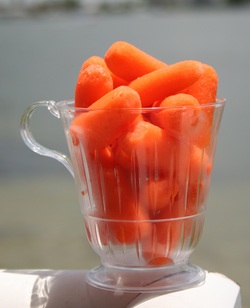|
|
|
27/2/2013 1 Comment Fish Oil Pills Useless by Pamela A. Popper, Ph.D., N.D.
The Wellness Forum Posted on 11/28/2012 Fish oils pills are still promoted by health professionals who insist that they are good for cardiovascular health. The evidence just does not back up the claim. A large meta-analysis of 89 studies published in 2006 showed no benefit, and a new study published in the Journal of the American Medical Association confirms it. This study was also a meta-analysis. Twenty studies with 68,680 participants conducted over the last 24 years were included. The patients included in the studies took an average of 1.5 grams of omega-3 supplements for an average of two years. There was no difference in the "risk of all-cause mortality, cardiac death, sudden death, myocardial infarction or stroke based on relative and absolute measures of association," the researchers concluded. In other words, the results were so bad that even when expressed in relative terms, which is how the drugs companies are able to make useless drugs seem beneficial, there was nothing good to report. It does not seem to matter, however. This study was published in September, and the American Heart Association is still advising people with heart disease to eat fish or take fish oil pills. The following was copied from the AHA's website on November 26, 2012: The American Heart Association recommends eating fish (particularly fatty fish) at least two times (two servings) a week. Each serving is 3.5 ounce cooked, or about ¾ cup of flaked fish. Fatty fish like salmon, mackerel, herring, lake trout, sardines and albacore tuna are high in omega-3 fatty acids. Increasing omega-3 fatty acid consumption through foods is preferable. However, those with coronary artery disease may not get enough omega-3 by diet alone. These people may want to talk to their doctor about supplements. And for those with high triglycerides, even larger doses could help. Not only does research show that the fish oil pills are useless, research shows that all oils promote weight gain and heart disease. I supposed this is one way for the AHA to make sure that it will continue to be in business - patients following the group's advice are likely to end up with progressing heart disease. The AHA is not alone - an internet search brought up many sites with doctors and nutritionists stating, essentially, that it does not matter what the research shows - they will continue to recommend fish oil pills. As I have said before, my colleagues are not easily convinced by evidence. The bottom line - stop taking fish oil pills. There is no evidence that they are beneficial and evidence that they are harmful. Rizos E, Ntzani E, Bika E, Kostapanos M, Elisaf M. "Association Between Omega-3 Fatty Acid Supplementation and Risk of Major Cardiovascular Disease Events: A Systematic Review and Meta-analysis." JAMA 2012:308(10):1024-1033 http://www.heart.org/HEARTORG/GettingHealthy/NutritionCenter/HealthyDietGoals/Fish-and-Omega-3-Fatty-Acids_UCM_303248_Article.jsp Touchstone Essentials offers the Wellspring formula, which is plant-based fatty acids and powerful antioxidants, providing the essentials for healthy heart and joints. Touchstone Essentials Member: ID#13463 Whole-food nutrition harvested right from the earth, bottled, delivering 100% un-compromised goodness.
1 Comment
 Why it’s so important to get your vitamins from whole foods, not chemicals. The vast majority of multivitamin and nutritional supplements are filled with synthetic or isolated fragments of vitamins, and this is certainly true for beta carotene, the precursor for vitamin A. What most people don’t know are the dangers that come with ingesting synthetic beta carotene. Beta carotene becomes vitamin A Natural beta carotene is one of the many brightly colored pigments found in fresh fruits and vegetables. This carotenoid serves as a precursor to vitamin A, a vitamin essential for vision, skin health, immune function, and gene transcription (the first step in gene expression). Because beta carotene converts to vitamin A in the body as needed, it offers all the health benefits of vitamin A without any of the toxicity of vitamin A sourced from high-dose supplements or cod liver oil. Natural beta carotene protects Studies on dietary intake of beta carotene from fruits and vegetables show natural beta carotene offers real long-term protective health benefits. Lower risk of Alzheimer’s In the Rotterdam study (JAMA 2002) the dietary intake of beta carotene was associated with a lower risk of Alzheimer’s disease among smokers. Lower risk of breast cancer An extensive analysis in the Journal of the National Cancer Institute (2012) showed that high dietary intake of carotenoids—including beta carotene—was strongly associated with a lower risk of breast cancer, particularly estrogen receptor negative (ER-) breast cancer. These health benefits can be attributed to the use of whole foods, where beta carotene is one of many carotenoids in the plant—with all of its necessary co-factors—delivering complete nutrition. Synthetic beta carotene linked to cancer The Finnish Study, a double-blind, placebo-controlled study published in the New England Journal of Medicine gave over 29,000 male smokers beta carotene and vitamin E, to evaluate the cancer-protective benefits of the vitamins. Surprisingly, the study authors discovered a HIGHER incidence of lung cancer (18%) in those receiving supplementation of beta carotene. And total mortality was 8% higher among those who received beta carotene than those who did not. Buried deep within the study methods is the admission that, “The study agents were formulated as synthetic dl-alpha-tocopheryl acetate (50 percent powder) and synthetic beta carotene (10 percent water-soluble beadlets); all formulations were colored with quinoline yellow.” How is synthetic beta carotene made? Is it any wonder that people taking synthetic beta-carotene have negative health outcomes when the ingredients used to make it include petrochemicals and harsh solvents? When you imagine beta carotene your mind may wander to the image of vegetables such as carrots, sweet potatoes, squash, spinach, broccoli, kale, pumpkin, parsley and peas. But that is not where synthetic beta carotene comes from. Instead the reality is synthetic beta carotene is manufactured from benzene extracted from acetylene gas (really, we’re not making this up). Benzene is a natural constituent of crude oil, and is one of the most basic petrochemicals. Not only do these substances have no nutritional value, benzene is considered to be a carcinogen or cancer-causing substance. Protect your health and check your labels Unfortunately, most supplements don’t tell you if the vitamins listed are synthetic because they are not legally required to do so. Labeling laws allow companies to call a chemical isolate by the same name as the complete nutrition found in whole food, even though they function entirely differently in the body. But there are ways you can tell. For vitamin A, if your supplement label says Vitamin A Palmitate, Retinyl Acetate or Vitamin A Acetate it is ALL synthetic. For beta carotene, unless the whole food source is listed, it is SYNTHETIC. Companies use synthetic vitamins because the ingredients (petrochemicals) are cheap, and because they think they can get away with making consumers think synthetic and food-based supplements are the same. They are not. As numerous scientific studies show, natural beta carotene is associated with a LOWER risk of cancer while synthetic beta carotene is associated with a HIGHER risk of cancer. Your body is not fooled. Touchstone offers whole food supplements, filled with pure, raw, fruits and veggies. Supergreens +D is filled with organic veggies and herbs that have natural beta carotene (and dozens of other carotenoids and compounds). Ingredients like broccoli, spinach and parsley, with all co-factors and enzymes intact, so they can deliver the full power of nourishment to protect your cellular health. Order yours today or add to your AutoShip by visiting www.mytouchstoneoffice.com! (article by Touchstone Essentials whole food supplements) Dr. Tracy Holdford provides a simple explanation to help us explain the difference between a probiotic and an enzyme, and why each is important for the body.
In its simplest terms, a Probiotic is a living bacteria that is helpful in aiding in digestion. There are types of bacteria that specialize in different food groups such as dairy (lactobacillus ), or protein (bifodobacteria), but all are there to help the digestive process, help control the unfriendly bacterial and control the pH and other environmental health factors of the colon and digestive system. Enzymes are naturally occurring chemicals that are produced by bacteria in our stomachs and digestive system, saliva, and are present in foods to help turn that apple into the nutritional building blocks our body can use. Digestive enzymes are diverse and are found in the saliva secreted by the salivary glands, in the stomach secreted by cells lining the stomach, in the pancreatic juice secreted by pancreatic exocrine cells, and in the intestinal (small and large) secretions, or as part of the lining of the gastrointestinal tract. So – Probiotics are living cells, and enzymes are natural chemicals that turn spinach and apples into usable building blocks of nutrition which our cells can use. Touchstone's organic wholefood supplement Supergreens + D has a rich blend of greens, enzymes and probiotics to better the function of your immune system. Green Energy has a unique blend of botanicals and proteolytic enzymes, which break down protein to keep our red blood cells flowing freely and able to deliver plenty of fresh oxygen to our cells and tissues. Green tea extract (decaffeinated, no less) aids in fatty acid metabolism, which also requires good oxygen flow, so they work very well together.* 8/2/2013 0 Comments What's The Difference Between Synthetic Vitamins and Natural Wholefood Vitamins. One of the first things you need to understand is that most products that are available contain vitamins that are fractionated, isolates or synthetic. What this means is that you are either not getting the actual vitamins but a synthetic form of it, or you are only receiving a part of, or fraction, of the actual vitamin. The body does not like synthetics. In fact, over years of use, synthetics can be harmful to your health. (Please see attached chart). An example is vitamin C. Most products list Vitamin C as Ascorbic Acid. Ascorbic acid is only one seventh of the vitamin C molecule. In essence your body in not receiving 6/7 of the potential of the Vitamin C and yet it is perfectly legal to claim a product as having or being Vitamin C when its source is ascorbic Acid. Do you know that most vitamins being purchased are sourced from petroleum esters, coal tar derivatives, ammonia, formaldehyde, Fumaric acid, etc. (see chart) The other important point to be made regarding whole food products like those we offer through Touchstone Essentials is that not only do you get the full complement of the specific vitamin offered by that plant, fruit, vegetable, but you get all of the other enzymes and complimentary components that make the vitamin C more effective and available to the body. Our bodies are extremely intelligent, they know what they need and in what form. Nature is and always will be the best source for what our bodies need. When you use organic, whole-food products your body is getting exactly what nature offers and exactly what your body needs. The reality is that all studies showing health benefits from vitamins are done on whole foods. Whole food nutrition is shown to be protective against cancer, to be good for your heart, soothes your joints and much, much more. Touchstone supplements are grown and “harvested,” not “manufactured." Whole foods—with all their vitamins, minerals, enzymes and phytonutrients intact—are uniquely equipped to nourish cells, with a complete nutritional profile that can access the “locked” ion channels found in cells. Most multivitamins are derived from chemicals (not food) and represent a single component of a vitamin molecule. In essence, they have only one number of what is a combination lock. The complex ion channels found in cells do not recognize most synthetics and isolates, making most “vitamins” ineffective. Our proprietary whole food formulas come from carefully selected farm-fresh fruits and veggies, minerals, herbs, natural enzymes and probiotics. In fact, each 3 capsule serving of our Essentials product is a rich blend with antioxidants in complete whole fruit and vegetable form that is the equivalent of 33 servings of farm-fresh fruits and veggies. Hundreds of clinical and peer reviewed studies show health benefits from antioxidant-rich foods, while “vitamins” show little to none. Check your supplement label against this scary chart to see what’s in your vitamins. So, as you can see it is very difficult to answer your question simply with numbers or amounts because there is so much more in a whole food product that makes it more effective and more bio-available to our bodies. I suggest you review the attached charts and compare them to the source of the products you are currently using. I would welcome an opportunity to have a conversation about this to answer any additional questions you might have so you can make the best informed decision possible. Thanks so much for your interest and your commitment to better personal health. Barbara is a qualified nutritionist offering Health, Nutrition & Lifestyle Counseling. She gives Healthy weight loss advice and promotes the Mediterranean diet. Barbara is also the author of the Med Life Diet - creating healthy eating and healthy lifestyle habits and attitudes for life !  Flaxseed oil contains a high percentage of omega-3 and medium percentage of omega-6. To match the omega-3 power of two tablespoons of flaxseed oil, you would have to eat nearly a kilo of albacore tuna. In Germany in the 1950's Johanna Budwig used it successfully in combination with cottage cheese as a tumour-reducing medication. She recommended that one or two tablespoons of low-fat cottage cheese be eaten with flaxseed oil to provide sulphur containing amino acids to interact with it in the body. Flaxseed oil is a wonderful remedy for perimenopausal symptoms yet it has quite the reputation as a cancer fighter. This is due to its ability to counteract the cancer-causing abilities of some omega-6 fatty acids. Omega-3 fatty acids have been shown to protect the body, particularly against cancers of the breast, colon, throat, and skin. Flaxseed oil is also credited with a long list of other health benefits including lowering blood cholesterol levels, helping insulin receptor binding, boosting immune system and bettering mineral metabolism. Lignans are a class of phytonutrients that quell perimenopause symptoms, as well as quenching free radicals and combating the cell-proliferating powers of excess estrogen. Consuming lignans helps prevent and treat other hormone dependent diseases, including heart disease and osteoporosis. In addition to increasing "good" cholesterol and decreasing "bad" cholesterol, lignans protect against bone loss and may increase bone density. Lignans also have estrogenic and anti-estrogenic activity which means that they have the power to adjust the estrogen in the body to meet it's changing requirements. By binding with estrogen receptors, lignans help regulate estrogen levels by escorting excess estrogen from the body. When buying flaxseed oil look for the kind that is high in lignans and also make sure that it is bottled in a dark glass. Refrigerate after you open it. It should not be used in cooking or baking although it can be poured over hot food. Take one or two tablespoons a day, swallow it straight or as a salad dressing, in a smoothie or over steamed vegetables. Photo: Flaxseed crackers I made the other day. So easy... I just added some flaxseeds, celery, carrot, red pepper, olive oil, dash of salt, cayenne pepper, turmeric, marjoram, lemon juice and orange juice. Threw it all in a food processor until it had a dough type consistency. Then I spread it on greaseproof paper onto my dehydrator sheets and dehydarted them for about 10 hours or so until they became crispy. |
AuthorBarbara is a qualified nutritionist offering Health, Nutrition & Lifestyle Counseling. She gives Healthy weight loss advice and promotes the Mediterranean diet. She is the author of the Med Life Diet - creating healthy lifestyle habits and attitudes for life ! Archives
April 2024
|
 RSS Feed
RSS Feed
